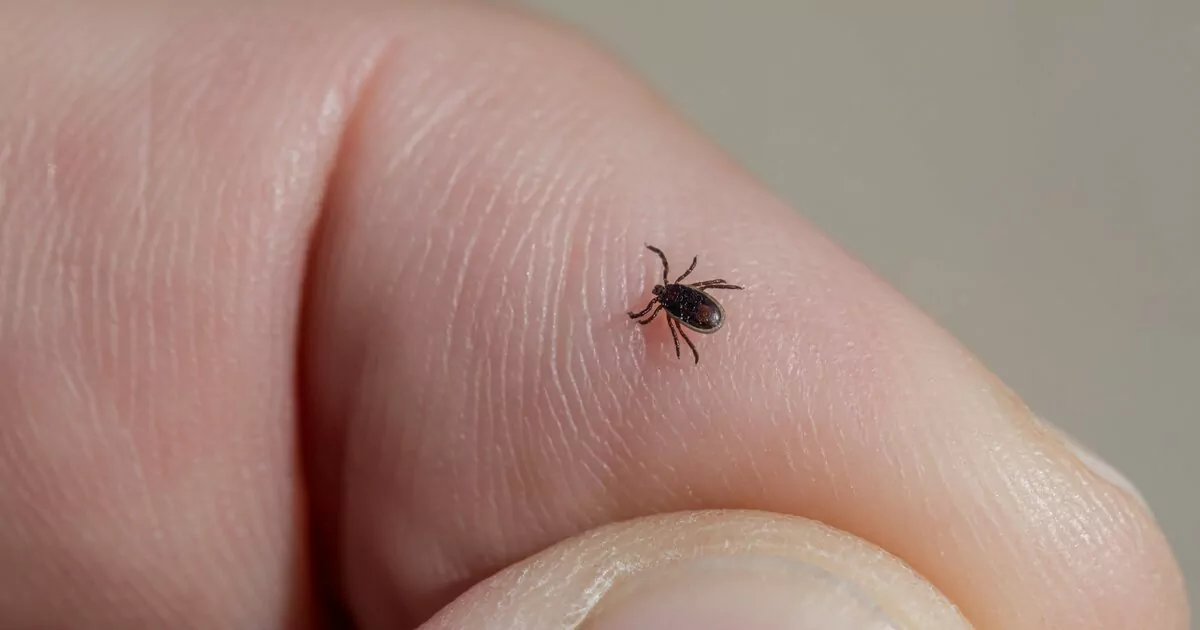Lyme disease, a tick-borne illness caused by the bacterium Borrelia burgdorferi, affects numerous body systems, often leading to neurological, cardiac, and joint issues. Less known, however, are its oral manifestations, which can sometimes mimic other conditions, making diagnosis challenging. Understanding the disease’s full body impact, including potential symptoms in dental health, is crucial for comprehensive care and timely intervention.
On this page:
Does Lyme Disease Make Your Teeth Fall Out? Understanding the Connection
It may surprise you to learn that Lyme disease teeth issues can have a direct impact on your oral health. This connection isn’t as well-known, but it’s vital to understand if you’re dealing with this tick-borne illness.
Bacteria causing Lyme disease can lead to inflammation throughout the body, including in the mouth. This inflammation can make existing dental problems worse or even trigger new ones. Some people with Lyme disease report more cavities despite good oral hygiene, which could be due to the bacteria affecting the mouth’s natural defenses against decay.
Gum disease might also be more common. Your immune system is busy fighting the infection, which might leave your gums more vulnerable to the bacteria that cause gum disease. Plus, some medications used to treat Lyme disease can reduce saliva flow, leading to dry mouth, which increases the risk of tooth decay and gum disease.
Even more puzzling is the tooth pain some Lyme disease patients experience, which can mimic dental issues like a toothache or sensitivity. However, this pain doesn’t always come from the teeth themselves. It could be a result of the nerves being affected by Lyme disease, leading to a condition known as neuropathy.
Recognizing Lyme Disease Symptoms in Oral Health
When Lyme disease begins to influence your mouth, you might notice some unusual symptoms. For some, this could mean having sore and swollen gums, which isn’t just uncomfortable – it can also make brushing and flossing a real pain. Others might find that their teeth are suddenly sensitive to hot or cold, which can make eating your favorite foods less fun.
Another symptom to watch out for is dry mouth. This might not sound like a big deal, but saliva is super important for keeping your mouth healthy. It fights off germs and helps to prevent cavities, so if your mouth is dry, you might find yourself dealing with more dental issues than usual.

In more severe cases, someone with Lyme disease could even have trouble with their jaw. It might feel stiff, or they could have a hard time moving it, which can make talking and eating difficult. There can also be a sudden onset of pain that feels like it’s coming from inside the jawbone.
These symptoms can come and go, just like other Lyme disease symptoms. This can be confusing and might make you wonder if your oral health issues are really related to Lyme disease. It’s like your body is sending mixed signals, and it can be hard to figure out what’s going on.
The Role of Dentists in Diagnosing and Managing Lyme Disease
As experts in oral health, dentists are in a prime position to spot the early signs of Lyme disease during routine dental check-ups. Some symptoms, like a toothache, facial pain, or jaw discomfort, can be mistaken for common dental issues. However, for individuals with Lyme disease, these could be indicators of the underlying condition.
Dentists can act as an important line of defense by asking patients about additional symptoms that may suggest Lyme disease, such as fatigue, fever, or muscle aches. If Lyme disease is suspected, a dentist can recommend that the patient seek a medical evaluation for a proper diagnosis.
In managing Lyme disease, dentists also play a supportive role. For those diagnosed with Lyme disease, dental professionals can offer advice on maintaining oral health and managing pain, which can be particularly challenging. They can tailor dental treatment plans to be sensitive to the patient’s overall health status and avoid overtaxing the patient’s immune system.
Regular dental visits provide an opportunity to monitor the progression of Lyme disease symptoms and the impact on oral health. This ongoing assessment ensures that any related dental issues are addressed promptly, lessening the likelihood of complications.
Oral Health Management Strategies for Lyme Disease Patients
Maintaining a consistent oral hygiene routine is crucial. Brushing twice a day with fluoride toothpaste and flossing at least once daily helps prevent plaque buildup, which can be more problematic for those with Lyme disease. Using an antibacterial mouthwash can also aid in reducing harmful bacteria that could lead to infections or further complications.
It’s also important for patients to stay hydrated. Does Lyme disease make your teeth fall out? Not directly, but conditions like dry mouth, which can be a side effect of Lyme disease medications, create an environment where bacteria can thrive and potentially lead to tooth loss. Drinking plenty of water stimulates saliva production, which naturally cleanses the mouth and helps protect against cavities and gum disease.
Nutrition plays a significant role as well. A balanced diet rich in vitamins and minerals, particularly vitamin C and calcium, supports gum health and the maintenance of strong teeth. Avoiding sugary snacks and acidic drinks is also beneficial, as these can contribute to tooth decay and enamel erosion.
Regular dental check-ups should not be skipped. Informing the dentist about the Lyme disease diagnosis allows for more personalized care. The dentist might recommend more frequent cleanings or specific treatments to address any oral health issues linked to the disease.
Managing stress is important because stress can weaken the immune system, making it harder to fight infections, including those that affect oral health. Techniques like mindful meditation, yoga, or even regular walking can help reduce stress and promote overall well-being.
Lyme Disease Teeth Fall Out: Examining Treatment Side Effects
Treatments often involve a course of antibiotics to fight the underlying infection. While these medications are vital in managing the disease, they can also have side effects that affect oral health. For example, certain antibiotics may disrupt the balance of beneficial bacteria in the mouth, which can lead to issues like oral thrush or a heightened risk of cavities.

In some cases, the medications used to combat Lyme disease can cause dry mouth, or xerostomia, which reduces saliva production. Saliva is essential for washing away food particles and neutralizing acids produced by bacteria in the mouth. Without enough saliva, the risk of dental decay and gum disease can increase. It’s important for patients to stay hydrated and perhaps use saliva substitutes or stimulants to manage this side effect.
Long-term antibiotic use can sometimes affect the color of teeth, leading to slight discoloration. Although this is less common, it’s something to be aware of, especially for children whose teeth are still developing, as some antibiotics can affect enamel formation.
Pain management is another aspect of Lyme disease treatment that can indirectly influence dental health. Some pain medications can also cause dry mouth or have sugary coatings that contribute to tooth decay if dental hygiene isn’t maintained.
To minimize these side effects, patients are encouraged to maintain a stringent oral hygiene routine, including regular brushing and flossing, and keep up with dental check-ups. Dentists can provide fluoride treatments or recommend specific toothpastes that help in remineralizing teeth and protecting them against the potential dental side effects of Lyme disease treatments.
Holistic Approaches to Lyme Disease Teeth and Oral Care
Instead of just treating symptoms, holistic dentists look at the whole person and how Lyme disease might be impacting their oral health and overall well-being. This means paying close attention to the materials used in dental work, understanding the body’s natural healing processes, and considering lifestyle factors that can influence recovery.
For someone with Lyme disease, a holistic dentist might use biocompatible materials for fillings or crowns to avoid potential reactions or sensitivities. They understand that a person with Lyme disease may have a heightened response to certain substances and strive to use materials that are safe and unlikely to cause further issues.
Holistic practitioners often suggest dietary changes to support oral health. This could include foods rich in vitamins and minerals that strengthen teeth and gums, as well as reducing sugar intake, which can promote inflammation and worsen Lyme disease symptoms.
They may also recommend herbal remedies and supplements to boost the immune system. For example, taking omega-3 fatty acids can help reduce inflammation, and antioxidants like vitamin C can help the body repair tissue, including gums affected by Lyme disease.
Another aspect of holistic dentistry involves stress reduction techniques, which can be crucial for someone dealing with Lyme disease. Stress can weaken the immune system and exacerbate symptoms, so practices like mindfulness, yoga, or even acupuncture may be encouraged as part of a comprehensive oral care plan.
Preventive Measures to Safeguard Oral Health Against Lyme Disease
Keeping your mouth healthy may help you avoid some of the dental complications that can come with Lyme disease. Start with good, basic oral hygiene. Brush your teeth at least twice a day and floss daily to prevent plaque buildup. Plaque is a sticky film of bacteria that can irritate your gums. If you’re already dealing with Lyme disease, your body might be more sensitive to these irritations.
Regular check-ups with your dentist are also key. These visits are not just about checking for cavities. Your dentist can spot early signs of gum disease and other oral health issues that you might not notice. And if you’re in the early stages of Lyme disease, you might not even realize that your dental health could be at risk.
Another important step is to maintain a balanced diet. Foods high in sugar can lead to tooth decay, while acidic foods and drinks can wear down your enamel. Both scenarios can make your teeth more vulnerable, especially if Lyme disease has already weakened your immune system or caused inflammation in your body.
If you spend a lot of time outdoors, protect yourself from ticks—the carriers of Lyme disease. Wear long sleeves and pants, use insect repellent, and do a full body check after coming inside. If you do find a tick, remove it as soon as possible. The quicker you remove it, the lower your risk of getting Lyme disease. And if you do get bitten, keep an eye on your health and contact your doctor if you notice any symptoms, such as Lyme disease teeth fall out.
Common Questions on Lyme Disease and Oral Symptoms
Can Lyme disease affect your teeth and gums? It’s a question many ask, especially when they notice unusual symptoms in their mouth. Yes, Lyme disease can indeed have implications for oral health. People with Lyme disease may sometimes experience tooth pain or sensitivity, which isn’t directly caused by the disease but rather from the immune response or potential nerve damage.
Is it common to get swollen gums with Lyme disease? While not as common as other symptoms like fatigue or joint pain, some patients do report swelling of the gums. This inflammation can be due to the body’s inflammatory response to the infection.
What about dry mouth – is that a Lyme disease thing? Absolutely. Lyme disease can affect various bodily functions, and saliva production is no exception. If you find your mouth feeling unusually dry, it could be related to Lyme disease or the medications used in its treatment.
Do people with Lyme disease get more cavities? There’s no direct link established between Lyme disease and an increased rate of cavities. However, if Lyme-related symptoms or medication side effects lead to less efficient oral hygiene practices or a drier mouth, this could, in turn, create an environment where cavities are more likely to develop.
Can Lyme disease cause issues with your sense of taste? Some patients do report changes in taste, which might be attributed to the infection or perhaps the medications used to treat it. If taste changes are affecting your ability to eat and maintain good nutrition, it’s important to talk to your healthcare provider.
The Importance of Oral Care in Lyme Disease Recovery
Maintaining good oral health is a vital part of recovering from Lyme disease. While the body fights the infection, being proactive about dental care can help minimize complications. It’s clear that Lyme disease can have an impact on oral health, so regular check-ups and following your dentist’s advice are key. Brushing, flossing, and using mouthwash are daily habits that can make a big difference. For those living with Lyme disease, these simple steps are not just about preventing cavities; they’re about supporting overall health and well-being during recovery. A healthy mouth is a strong ally in your journey to wellness.
